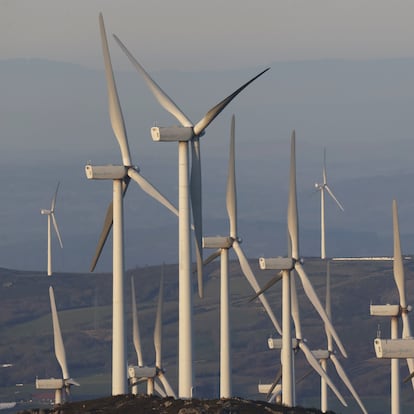Brussels is considering relaxing controls and punishments if companies fail to comply with the 'green agenda'


The European Commission is specifying the administrative “simplification” it has promised for the start of its mandate. The main idea is to relieve companies of bureaucracy, between 25% and 35%, without diluting the ambition of the EU's climate and social objectives. The details that are becoming known, however, point to a lesser environmental demand on companies, such as the application of the law a year later than planned (from 2027 to 2028), less significant maximum sanctions than initially decided, or the elimination of the ability to litigate through civil means for unions and NGOs when they believe that the law is being breached. This is what is included in a partial draft to which this newspaper has had access of the so-called omnibus law, which is being prepared by Brussels and which in principle will be approved by the College of Commissioners this Wednesday.
The range of measures that the Commission is considering putting on the table is limited to changes to the Corporate Sustainability Due Diligence Directive (CSDDD). This seeks to ensure that companies comply with environmental standards and fight against child exploitation, both within the corporation itself and in its supply chain, and was approved less than a year ago. But it is not the only regulation that is expected to undergo changes. There are also changes, among others, to the carbon border adjustment mechanism, which aims to charge for industrial products that arrive in the EU produced with less demanding environmental standards. In this case, the idea is to exempt small importers, those who bring products into the EU whose manufacture has caused carbon dioxide emissions of less than 50 tonnes. With the current wording, this group of businessmen did have to make the corresponding customs declarations.
Another element expected to appear among this week's initiatives is the so-called taxonomy , the classification that establishes which investments can be classified as favourable to the fight against climate change. However, European sources were confident on Monday that it would not appear among the regulations to be modified.
The first omnibus package for “simplification”, which will be launched on Wednesday, is still subject to changes, warn several community sources familiar with the negotiations. External pressure on the Commission is great: on the one hand, there are companies and employers' organisations, which are betting on greater “simplification”, strongly supported by countries such as France and Germany; on the other, there are NGOs, trade unions and political parties (social democrats and greens), which warn that this initiative has a great risk of neglecting the environmental objectives set in the last legislature. The goal can be summed up in one figure and one date: reaching a decarbonised economy by 2050.
Since Ursula von der Leyen, the President of the European Commission, launched the idea of reducing administrative burdens on companies as one of the measures to boost competitiveness last July – that is, before Donald Trump’s victory in the US elections – Brussels has insisted that the revisions are not intended to lower environmental standards. The aim is to “simplify” (the word deregulate is deliberately avoided) in order to reduce bureaucracy. “We are not abolishing our political objectives, including the Green Deal objectives , such as carbon neutrality by 2050 and the 2030 target of 55% emissions reduction. We are looking at how we can get there with lower costs and more efficiency,” responded Valdis Dombrovskis, the commissioner responsible for this task, in a recent interview with this newspaper .
The Social Democratic Group, the second largest in the European Parliament, is not at all convinced by this declaration of intent. In fact, last week they sent a letter to Von der Leyen in which they expressed their concern about the future of a directive that has not yet been implemented and that “does not contain additional reporting obligations”. This was not the only letter of this kind that the Executive of the Union has received: days before, it was the Government of Spain that asked it not to open the door to lowering the ambition of the European green agenda.
Environmental organisations have also stressed in recent days that the rules to be amended already lost their ambition during the negotiations between the Parliament and the Council of the EU during the previous term. Lowering them even further, they argue, will drastically weaken the environmental obligations of companies, which will also have little incentive to comply with the legal obligations that are spared from the sieve, since the punishment for non-compliance has also been reduced. All this, they point out, when the regulations are not even in force yet, without having carried out transparent impact analyses of the changes and at a time when quite a few companies have already made substantial investments to adapt to the new rules, which are now potentially amended.
“The Commission has decided to scrap three key pillars of the Green Deal that ensure companies act responsibly throughout the entire value chain – a reckless move that could not only hamper the EU’s environmental goals but also market competitiveness,” warns Amandine van den Berghe, head of practice for Client Earth, an NGO of lawyers that sues companies and governments in 60 countries to “hold them accountable for their climate commitments.”
In contrast to Madrid and the environmental lobbies , there have been movements from Paris and Berlin, which are putting pressure on the Commission to “simplify regulation”. Many business organisations are with them, including the large Spanish employers’ association, CEOE, which sent a letter to Brussels on Monday stressing that “regulatory simplification does not question the commitment of companies to climate objectives and the European social model: it is precisely [...] how we will facilitate the fulfilment of our common objectives”.
EL PAÍS






